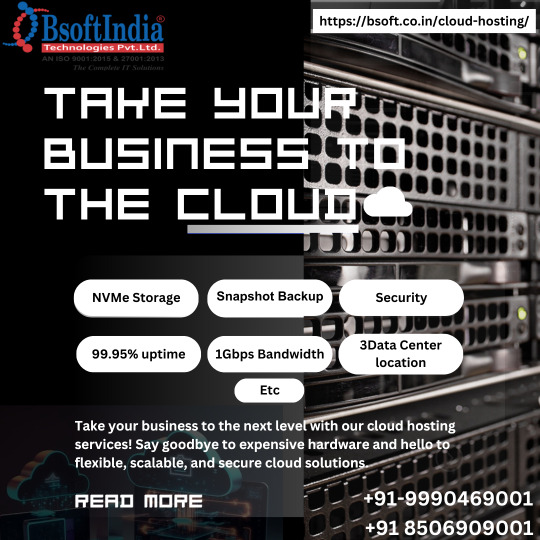#cloud service provider
Explore tagged Tumblr posts
Text
Secure and Scalable Cloud Server Management at Atcuality
For businesses seeking to enhance scalability and maintain top-tier security, Atcuality provides unparalleled cloud server management services. Our solutions cover all aspects of cloud server maintenance, including load balancing, patch management, data backups, and disaster recovery planning. Our experienced professionals work with cutting-edge tools to ensure that your servers are secure, efficient, and scalable to meet changing business needs. Whether you operate in e-commerce, finance, or technology, we tailor our services to align with your operational goals. With Atcuality as your trusted partner, you can focus on driving growth while we handle the technical complexities of cloud management.
#seo marketing#seo services#artificial intelligence#azure cloud services#seo agency#digital marketing#seo company#iot applications#ai powered application#amazon web services#ai applications#virtual reality#augmented reality agency#augmented human c4 621#augmented and virtual reality market#augmented intelligence#augmented reality#cloud security services#cloud computing#cloud services#cloud service provider#cloud server hosting#software#devops#information technology#cash collection application#task management#blockchain#web developing company#web development
2 notes
·
View notes
Text
4 notes
·
View notes
Text
Journey to Devops
The concept of “DevOps” has been gaining traction in the IT sector for a couple of years. It involves promoting teamwork and interaction, between software developers and IT operations groups to enhance the speed and reliability of software delivery. This strategy has become widely accepted as companies strive to provide software to meet customer needs and maintain an edge, in the industry. In this article we will explore the elements of becoming a DevOps Engineer.
Step 1: Get familiar with the basics of Software Development and IT Operations:
In order to pursue a career as a DevOps Engineer it is crucial to possess a grasp of software development and IT operations. Familiarity with programming languages like Python, Java, Ruby or PHP is essential. Additionally, having knowledge about operating systems, databases and networking is vital.
Step 2: Learn the principles of DevOps:
It is crucial to comprehend and apply the principles of DevOps. Automation, continuous integration, continuous deployment and continuous monitoring are aspects that need to be understood and implemented. It is vital to learn how these principles function and how to carry them out efficiently.
Step 3: Familiarize yourself with the DevOps toolchain:
Git: Git, a distributed version control system is extensively utilized by DevOps teams, for code repository management. It aids in monitoring code alterations facilitating collaboration, among team members and preserving a record of modifications made to the codebase.
Ansible: Ansible is an open source tool used for managing configurations deploying applications and automating tasks. It simplifies infrastructure management. Saves time when performing tasks.
Docker: Docker, on the other hand is a platform for containerization that allows DevOps engineers to bundle applications and dependencies into containers. This ensures consistency and compatibility across environments from development, to production.
Kubernetes: Kubernetes is an open-source container orchestration platform that helps manage and scale containers. It helps automate the deployment, scaling, and management of applications and micro-services.
Jenkins: Jenkins is an open-source automation server that helps automate the process of building, testing, and deploying software. It helps to automate repetitive tasks and improve the speed and efficiency of the software delivery process.
Nagios: Nagios is an open-source monitoring tool that helps us monitor the health and performance of our IT infrastructure. It also helps us to identify and resolve issues in real-time and ensure the high availability and reliability of IT systems as well.
Terraform: Terraform is an infrastructure as code (IAC) tool that helps manage and provision IT infrastructure. It helps us automate the process of provisioning and configuring IT resources and ensures consistency between development and production environments.
Step 4: Gain practical experience:
The best way to gain practical experience is by working on real projects and bootcamps. You can start by contributing to open-source projects or participating in coding challenges and hackathons. You can also attend workshops and online courses to improve your skills.
Step 5: Get certified:
Getting certified in DevOps can help you stand out from the crowd and showcase your expertise to various people. Some of the most popular certifications are:
Certified Kubernetes Administrator (CKA)
AWS Certified DevOps Engineer
Microsoft Certified: Azure DevOps Engineer Expert
AWS Certified Cloud Practitioner
Step 6: Build a strong professional network:
Networking is one of the most important parts of becoming a DevOps Engineer. You can join online communities, attend conferences, join webinars and connect with other professionals in the field. This will help you stay up-to-date with the latest developments and also help you find job opportunities and success.
Conclusion:
You can start your journey towards a successful career in DevOps. The most important thing is to be passionate about your work and continuously learn and improve your skills. With the right skills, experience, and network, you can achieve great success in this field and earn valuable experience.
2 notes
·
View notes
Text

Whether you’re planning to host your own web site or update from a customary web hosting plan, cloud hosting gives lots of benefits.
Beginner-pleasant. A managed cloud hosting solution doesn’t require any technical understanding. The carrier issuer will keep up the cloud servers and your web site’s backend.
High availability. When a server fails, another one within the network will act as a backup, always protecting your web site online at all times.
Collaboration: Cloud hosting can facilitate collaboration among teams, as more than one users can access and edit files concurrently.
Traffic load balancing. Traffic-managing responsibilities are unfolded throughout cloud web servers to preserve high performance.
Scalability. Unlike traditional hosting services, web site proprietors don’t have to share their bandwidth, data storage, and computing power. The web host presents digital sources for each user, making it easier to scale their website.
Greater safety. Since cloud web hosting offerings use a handful of virtual machines, they're much less susceptible to hardware malfunctions. Moreover, the load balancing function can help prevent DDoS assaults.
Get a free demo and learn more about our cloud hosting solutions. https://bsoft.co.in/cloud-demo/
#cloud hosting#clouds#cloud services#technology#marketing#service#digital marketing#branding#delhi#cloudservice#city#ecommerce#cloud service provider
2 notes
·
View notes
Text
Tip: Focus on What value you get once Cloud Solution is implemented for next business growth OR innovation.
Do you know, Techjour's Cloud Solution reduces business operating cost, gives security to data and flexibility to focus more on your business. It meets immediate on-demand business need, in fast moving digital world.

#devopsengineer#devopstools#devops#cloud solutions#cloud service provider#cloud services#google cloud#cloudcomputing#cloudmigration#cloudconsulting#kubernetes#ansible#jenkins github#startup#automation#technology#trendingnow#successful business#small business#digital business#docker#sme#entrepreneur#digital strategy
0 notes
Text
Cloud EMRs: Boost Efficiency & Security in Healthcare
In today's rapidly evolving healthcare landscape, selecting the right cloud-based Electronic Medical Record (EMR) system is crucial for hospitals aiming to enhance patient care, streamline operations, and ensure data security. With numerous options available, it's essential to identify solutions that align with your hospital's specific needs. Let's explore some of the top cloud-based EMR systems that have garnered attention in the healthcare community.
1. Epic Systems
Epic Systems is a prominent player in the EMR industry, offering a comprehensive suite of applications tailored for various healthcare settings. Their cloud-based solutions support functions related to patient care, including registration, scheduling, clinical systems for healthcare providers, and billing systems for insurers. Epic's applications are designed to enhance patient care and streamline hospital operations.
2. eClinicalWorks
eClinicalWorks provides a cloud-based EMR system that integrates practice management and electronic health records. Their platform offers structured data collection, trend analysis, and customizable documentation options suitable for various healthcare specialties. The Patient Hub feature allows clinicians to access all aspects of patient records efficiently.
3. athenahealth
athenahealth offers a cloud-based EMR solution known as athenaOne, which combines practice management, an electronic health record system, and care coordination into a single package. Their platform is designed to streamline patient management, appointment scheduling, and communication among healthcare providers.
4. AdvancedMD
AdvancedMD provides a cloud-based EMR system designed for independent healthcare practices. Their platform includes features such as practice and revenue cycle management, appointment scheduling, and analytical reporting. The software integrates seamlessly with other medical systems, offering a centralized platform for healthcare professionals.
5. Kareo Clinical
Kareo Clinical is a cloud-based EMR software designed specifically for independent practices. It integrates billing, practice management, and electronic health records features, making it a favorite for solo practitioners. Key features include billing integration, customizable templates, and patient engagement tools.
6. NextGen Healthcare
NextGen offers a cloud-based EMR platform that provides a fully integrated practice management solution called “MediTouch.” This includes a patient portal, claims clearinghouse, and specialty-specific content. The software is compatible with tablets and laptops, touchscreen-enabled, and HIPAA compliant.
7. Praxis EMR
Praxis EMR is an AI-driven, template-free EMR system that learns from the user, enabling faster, smarter, and more personalized documentation. It's rated highly for usability, making it a preferred choice for many physicians.
8. CareCloud
CareCloud offers a cloud-based EMR system that stores patient data and provides features like clinical decision support and a patient portal. It's customizable, secure, and HIPAA-compliant, making it suitable for medium to large medical groups and healthcare systems across various specialties.
9. Meditech Expanse
Meditech Expanse is a cloud-based EMR software that facilitates data management, encompasses patient engagement tools, and is HIPAA compliant. It offers iOS and Android-compatible apps for mobile access to patient data and the potential for AI integration. It's suitable for medium to large hospitals and can handle complex workflows and patient volumes.
10. Allscripts
Allscripts provides a comprehensive cloud-based EMR system that offers advanced features for clinical documentation and practice management. It's a popular choice among larger healthcare organizations due to its robust functionality.
Conclusion
When selecting a cloud-based EMR system, consider factors such as scalability, user-friendliness, integration capabilities, and compliance with healthcare regulations. Engaging with cloud consulting companies can provide valuable insights tailored to your hospital's unique requirements. Additionally, partnering with providers that offer cloud management services ensures that your EMR system remains efficient, secure, and up-to-date.
For smaller practices, exploring EMR systems for small practices can lead to solutions that are both cost-effective and tailored to the specific needs of a smaller healthcare setting.
Investing in the right cloud service for business is a strategic move that can significantly enhance patient care, improve operational efficiency, and ensure data security in today's digital healthcare environment.
0 notes
Text
Full Stack Development Company in NYC

Full Stack Development Company in NYC
In the bustling digital landscape of New York City, finding the right Full Stack Development Company NYC can be a game-changer for your business. Whether you're launching a new startup or upgrading your existing platform, the expertise of a full stack team is essential to ensure seamless integration of front-end and back-end technologies.
A full stack development company specializes in creating comprehensive digital solutions, blending user-friendly interfaces with robust server-side frameworks. This ensures that your website or application performs flawlessly across all platforms, delivering a superior user experience.
Partnering with a local NYC-based full stack development firm offers unique advantages. They understand the competitive dynamics of the city’s market and can tailor solutions that align with your business goals. Moreover, face-to-face collaboration can streamline project timelines and foster better communication.
When choosing a partner, look for a company with a proven track record, diverse tech stack expertise, and a client-centric approach. They should be proficient in modern technologies like React, Angular, Node.js, and Python, ensuring your project stays ahead of the curve.
If you’re ready to elevate your digital presence, consider exploring White Leaf. As a leading full stack development company in NYC, they specialize in crafting custom solutions that drive growth and innovation. From initial consultation to deployment and beyond, their team ensures your project’s success every step of the way.
Don’t let your competitors outpace you invest in professional full stack development today visit our website : White Leaf
0 notes
Text
Unlock the benefits of cloud migration with Simple Logic! This blog explores the types of cloud migration—public, private, hybrid, and multi-cloud—and their advantages, including scalability, cost savings, and enhanced performance. Learn how a strategic migration can future-proof your business in 2023 and beyond. ☁️💼
#simplelogic#makingitsimple#simplelogicit#makeitsimple#itservices#itcompany#itmanagedservices#cloud#cloudmigration#cloudservice#cloud service provider#cloud services#cloudmigrationservice
0 notes
Text
#cloud service provider#cloud services#cloud computing#cloud hosting in saudi arabia#cloud hosting service#cloud hosting provider
1 note
·
View note
Text
AWS Cloud Managed Services: Market Size, Growth, and Forecast for 2030
In today’s rapidly evolving cloud ecosystem, businesses are increasingly relying on cloud service providers to streamline operations, reduce costs, and enhance scalability. Amazon Web Services (AWS), the dominant player in the cloud services market, has emerged as a leader not only in infrastructure services but also in managed services. AWS Managed Services (AMS) offer a suite of solutions that help organizations offload day-to-day infrastructure management tasks while optimizing their cloud environment for performance, security, and cost-efficiency.
As enterprises continue to migrate to the cloud, the demand for AWS Managed Services is expected to grow significantly. In this blog, we will delve into the market size, growth trajectory, and forecast for AWS Managed Services leading up to 2030.

What Are AWS Cloud Managed Services?
AWS Managed Services (AMS) are designed to help businesses monitor, manage, and optimize their AWS cloud environments with minimal effort and resources. These services typically cover infrastructure management, security, incident response, backup, patch management, and system monitoring. AMS is ideal for organizations that want to leverage the full potential of AWS without dedicating substantial internal resources to manage these complex tasks.
Key Features of AWS Cloud Managed Services:
24/7 Monitoring and Support: AMS offers round-the-clock monitoring and management of cloud infrastructure to ensure optimal performance.
Security and Compliance: With built-in security features, including vulnerability scanning, patch management, and compliance reporting, AWS helps businesses stay secure and compliant.
Cost Optimization: AMS helps businesses monitor and manage their cloud spending with intelligent resource management and right-sizing.
Scalability and Flexibility: AWS’s managed services scale as your business grows, ensuring you have the right resources at the right time.
The Growing Demand for AWS Cloud Managed Services
The increasing complexity of managing cloud environments is a driving force behind the rapid adoption of managed services. More organizations are shifting to the cloud to take advantage of its scalability, flexibility, and cost-effectiveness. However, cloud environments also present unique challenges related to management, security, compliance, and performance optimization. For many organizations, especially those without specialized cloud expertise, outsourcing the management of these environments to a third party like AWS is a logical choice.
Key factors driving the demand for AWS Managed Services include:
Cloud Migration and Adoption: As businesses continue to migrate to AWS, the need for managed services is rising. AWS offers robust managed services tailored for enterprises, making it easier for organizations to transition from on-premises infrastructures to the cloud.
Cost Control and Efficiency: Managing and optimizing costs is one of the biggest challenges for businesses using the cloud. AWS Managed Services offer businesses the tools and expertise to control cloud spending, ensuring resources are used efficiently.
Security and Compliance Needs: Security is a major concern for businesses operating in the cloud. AWS Managed Services help organizations meet regulatory requirements and adhere to best practices for security and compliance.
Focus on Core Business: By outsourcing cloud management to AWS, organizations can focus on their core competencies rather than spend time and resources managing IT infrastructure.
Growing Complexity of Cloud Environments: As businesses expand their use of cloud-native technologies (like Kubernetes, serverless computing, and machine learning), managing these complex environments becomes more challenging. AWS Managed Services provide the expertise to optimize and support these advanced cloud environments.
Market Size and Growth of AWS Managed Services
The global market for cloud-managed services is rapidly expanding. According to a 2023 report by Grand View Research, the global cloud managed services market was valued at approximately $47.76 billion in 2022 and is projected to grow at a compound annual growth rate (CAGR) of 12.3% from 2023 to 2030. The growth is being fueled by the widespread adoption of cloud technologies, the shift to hybrid cloud models, and the growing need for IT cost optimization.
While the overall managed services market includes services from other providers like Microsoft Azure, Google Cloud, and IBM, AWS commands a significant share of this market due to its dominant position in the cloud industry.
Current Market Share of AWS Managed Services: AWS continues to be a market leader in the cloud services space, holding a dominant share of the cloud infrastructure market, which is estimated to be around 33% as of 2024, according to Synergy Research Group. With this strong position in the overall cloud market, AWS is well-positioned to capture a large portion of the managed services market as well.
Growth Trajectory: The demand for AWS Managed Services is expected to grow in line with the broader cloud services market. By 2030, the AWS Managed Services market is anticipated to be worth $30-$35 billion globally. This growth is underpinned by the expansion of digital transformation initiatives and the increasing reliance on cloud-native services.
Regional Growth: North America and Europe currently dominate the AWS Managed Services market due to their high cloud adoption rates and the presence of many large enterprises. However, the Asia-Pacific region is expected to witness the highest growth rate in the coming years, driven by increasing digitalization in countries like China, India, Japan, and South Korea.
Key Drivers for Growth Toward 2030
Cloud-Native Technologies and Automation: AWS is continuously innovating with services like AWS Lambda (serverless computing), Amazon ECS (Elastic Container Service), and Amazon EKS (Elastic Kubernetes Service). As more organizations adopt cloud-native technologies, the need for specialized management services will increase, benefiting AWS Managed Services.
Artificial Intelligence (AI) and Machine Learning (ML): AI and ML technologies are becoming more accessible through AWS Managed Services. AWS offers tools like Amazon SageMaker and other ML services that can be managed through AMS, reducing the complexity of these advanced technologies and making them accessible to businesses of all sizes.
Security and Regulatory Requirements: With increasing regulatory scrutiny around data privacy (GDPR, CCPA) and security concerns, AWS Managed Services will play a critical role in helping businesses meet their compliance and security obligations.
Expansion of Hybrid and Multi-Cloud Environments: Many businesses are adopting hybrid cloud or multi-cloud strategies, incorporating AWS alongside other cloud providers like Azure and Google Cloud. AWS Managed Services can help businesses manage these complex environments, fostering growth in AMS adoption.
Automation and AI-Driven Operations: As AWS continues to integrate artificial intelligence and automation into its managed services offerings, businesses can benefit from more efficient operations, enhanced security, and faster incident response times.
AWS Managed Services Market Forecast for 2030
Looking ahead to 2030, the AWS Managed Services market is poised for exponential growth, driven by the following key trends:
Cloud Maturity and Integration: By 2030, cloud environments will be more integrated and automated, with AI-driven systems providing intelligent operations. AWS will be at the forefront of this evolution, offering managed services that not only monitor infrastructure but also proactively optimize performance and cost.
Smaller Enterprises Adopting Managed Services: With the increasing affordability of AWS services and more tailored solutions, small and medium-sized enterprises (SMEs) will also increasingly adopt AWS Cloud Managed Services, contributing to market growth.
Expansion into Emerging Markets: AWS is likely to expand its presence in emerging markets like Latin America, Southeast Asia, and Africa, where the adoption of cloud services is accelerating. These regions will see substantial growth in demand for managed services, with AWS playing a key role.
Conclusion
AWS Managed Services are at the heart of a transformative shift in the cloud industry. As businesses face increasing complexity in managing their cloud infrastructures, the demand for AWS’s expertise and services will only grow. By 2030, the AWS Managed Services market is expected to be a multi-billion-dollar industry, driven by the need for optimized cloud environments, enhanced security, cost efficiency, and access to cutting-edge technologies like AI and machine learning.
For businesses looking to take advantage of the cloud while minimizing the complexities of management, AWS Managed Services offer a comprehensive, scalable, and cost-effective solution. With AWS continuing to innovate and expand its offerings, the future of managed services looks promising, with the potential to reshape the cloud landscape for the coming decade.
#AWS Managed Services#AWS Cloud Managed Services#aws cloud services#cloud migration companies#cloud solutions#cloud service provider#cloud services
0 notes
Text
Cloud Server Technology: The Game-Changer That Came From The Skies
1 note
·
View note
Text
Unlock the Future of Immersive Experiences with AR/VR Development Services
At Atcuality, we bring the future of digital experiences to life with our cutting-edge AR/VR development services. Our team of experts specializes in creating customized augmented and virtual reality solutions that elevate your brand and engage your audience like never before. Whether you’re looking to build interactive virtual environments, enhance customer experiences, or revolutionize training methods, we tailor each project to meet your unique business needs. Our AR/VR solutions are designed to seamlessly integrate into various industries, from gaming and entertainment to education, real estate, and healthcare. By choosing Atcuality’s AR/VR development services, you gain access to the latest technology and innovation that provides your users with an immersive and unforgettable experience. We focus on quality and precision to ensure that your augmented and virtual reality solutions are not only visually stunning but also highly functional and effective in achieving your business goals. Elevate your business with the power of AR/VR technology. Explore how we can help you bring your vision to life with our tailored AR/VR solutions.
#seo services#seo agency#seo marketing#digital marketing#ppcadvertising#seo company#web development#web design#web developers#web developing company#website developer near me#website development#website developers#ar vr technology#game design#game development#game developers#artificial intelligence#machine learning#amazon web services#android app development#android application development#azure cloud services#azure cloud computing#azure cloud migration#blockchain#cloud security#cloud services#cloud service provider#cloud server hosting
1 note
·
View note
Text
Sify's Cloud Services: Powering the Digital Transformation of Tomorrow
In an era where digital transformation is at the forefront of business strategy, cloud services have become the backbone of innovation, scalability, and efficiency. As enterprises across the globe pivot to cloud-based solutions, Sify stands out as a trusted partner in this journey. With a comprehensive suite of cloud services tailored to meet the unique needs of businesses, Sify empowers organizations to harness the full potential of the cloud, driving growth, agility, and competitive advantage.
The Strategic Importance of Cloud Services
Cloud services have revolutionized the way businesses operate, offering a flexible and scalable approach to managing IT infrastructure, applications, and data. By migrating to the cloud, organizations can reduce costs, enhance collaboration, improve business continuity, and accelerate innovation. However, navigating the complexities of cloud adoption requires expertise and a deep understanding of the unique challenges each business faces. This is where Sify’s Cloud Services come into play.
1. Scalability and Flexibility
One of the most significant advantages of cloud services is the ability to scale resources up or down based on demand. Sify’s cloud solutions provide businesses with the flexibility to adjust their IT infrastructure to meet changing needs, ensuring that they only pay for what they use. This elasticity is particularly valuable in today’s fast-paced business environment, where agility is key to staying competitive.
2. Cost Efficiency
By moving to the cloud, businesses can significantly reduce their capital expenditures on hardware and software. Sify’s Cloud Services offer a pay-as-you-go model, allowing organizations to shift from a CapEx to an OpEx model. This not only reduces upfront costs but also provides predictable and manageable operating expenses, freeing up resources for other strategic initiatives.
3. Enhanced Security and Compliance
Security and compliance are top priorities for businesses in the digital age. Sify’s Cloud Services are built with robust security measures that protect data and applications from threats. With industry-leading encryption, identity management, and compliance monitoring, Sify ensures that businesses meet regulatory requirements and protect sensitive information, whether in transit or at rest.
4. Business Continuity and Disaster Recovery
Unplanned downtime can have severe consequences for businesses. Sify’s Cloud Services include comprehensive business continuity and disaster recovery solutions that ensure minimal disruption in the event of an outage or disaster. With automated backups, real-time replication, and rapid recovery options, Sify helps businesses maintain operations and safeguard critical data.
Sify’s Comprehensive Cloud Service Offerings
Sify’s Cloud Services encompass a wide range of solutions, each designed to address the specific needs of businesses across industries. From cloud migration to managed cloud services, Sify provides end-to-end solutions that enable organizations to fully leverage the power of the cloud.
1. Cloud Migration Services
Migrating to the cloud is a complex process that requires careful planning and execution. Sify’s Cloud Migration Services are designed to simplify this journey, ensuring a smooth and seamless transition from on-premises infrastructure to the cloud.
Assessment and Strategy: Sify begins with a thorough assessment of the existing IT environment, identifying workloads and applications that are suitable for cloud migration. Based on this analysis, Sify develops a customized migration strategy that aligns with the business’s goals and objectives.
Migration Execution: Sify’s team of experts handles the entire migration process, from data transfer and application rehosting to re-architecting and optimization. With minimal disruption to operations, Sify ensures that businesses can quickly and efficiently move to the cloud.
2. Managed Cloud Services
Managing cloud infrastructure can be challenging, especially for businesses with limited IT resources. Sify’s Managed Cloud Services provide comprehensive management and support, allowing organizations to focus on their core business while Sify handles the complexities of the cloud.
Infrastructure Management: Sify offers round-the-clock monitoring, maintenance, and optimization of cloud infrastructure. This includes performance management, capacity planning, and security monitoring, ensuring that the cloud environment is always running at peak efficiency.
Application Management: In addition to infrastructure, Sify also manages applications hosted in the cloud. This includes application performance monitoring, patch management, and troubleshooting, ensuring that critical applications are always available and performing optimally.
3. Multi-Cloud and Hybrid Cloud Solutions
Many businesses today are adopting multi-cloud and hybrid cloud strategies to leverage the best of both worlds. Sify’s Multi-Cloud and Hybrid Cloud Solutions provide the flexibility to deploy workloads across multiple cloud environments, whether public, private, or on-premises.
Multi-Cloud Management: Sify’s multi-cloud solutions enable businesses to manage multiple cloud platforms from a single pane of glass. This simplifies cloud management, reduces complexity, and ensures consistent security and governance across all cloud environments.
Hybrid Cloud Integration: For businesses that require a mix of on-premises and cloud resources, Sify offers hybrid cloud solutions that seamlessly integrate existing infrastructure with the cloud. This provides the flexibility to deploy workloads where they make the most sense, whether for cost, performance, or compliance reasons.
4. Cloud Security Services
Security is a critical concern in the cloud, and Sify’s Cloud Security Services are designed to protect businesses from evolving threats. With a multi-layered approach to security, Sify ensures that cloud environments are secure, compliant, and resilient.
Threat Detection and Response: Sify’s advanced threat detection and response capabilities provide real-time monitoring and automated responses to potential security incidents. This proactive approach minimizes the risk of data breaches and ensures that security threats are addressed before they can cause damage.
Compliance Management: Sify’s cloud security solutions include comprehensive compliance management, ensuring that businesses meet industry standards and regulatory requirements. This includes data encryption, identity and access management, and regular security audits.
Why Choose Sify for Cloud Services?
Sify is a leader in digital transformation, with a proven track record of delivering innovative cloud solutions that drive business success. By choosing Sify for cloud services, businesses gain access to a trusted partner with deep expertise, a comprehensive service portfolio, and a commitment to customer success.
1. Expertise and Experience
With years of experience in cloud computing, Sify’s team of experts brings a wealth of knowledge and technical expertise to every project. Sify’s cloud solutions are designed to meet the specific needs of each business, ensuring that organizations can achieve their goals with confidence.
2. Customer-Centric Approach
Sify takes a customer-centric approach to cloud services, working closely with businesses to understand their unique challenges and objectives. This collaborative approach ensures that Sify’s solutions are tailored to deliver the maximum value, helping businesses achieve their strategic goals.
3. Innovation and Agility
In a rapidly changing technology landscape, Sify is committed to innovation and agility. Sify continually invests in new technologies and approaches, ensuring that its cloud services remain at the cutting edge of the industry. This commitment to innovation helps businesses stay ahead of the competition and adapt to changing market conditions.
As businesses embrace the digital future, cloud services are becoming a critical enabler of innovation, efficiency, and growth. Sify’s comprehensive cloud solutions provide the scalability, security.
0 notes
Text
What Key challenges do you face in your retail business?
+ Reduction of operative cost and expenses
+ Seamless Customer Experience across all Channels
+ Right Technology Implementation
+ Increase of Customer base and Consumer engagement
+ Market business and create brand awareness
+ Automate process and technology
Connect us to help you in your retail business.

#technology#automation#startup#trendingnow#retailsolutions#retail technology#retail investors#techjour#retail#ecommerce#odoo crm#odoo services#odoo development company#odooimplementation#cloud solutions#cloud service provider#magento#customer experience#customer engagement
0 notes
Text
0 notes
Text
Full-Stack Development Services in NYC
Discover professional Full-Stack Development Services in NYC with White Leaf. Build custom, scalable applications tailored to your business needs.
0 notes